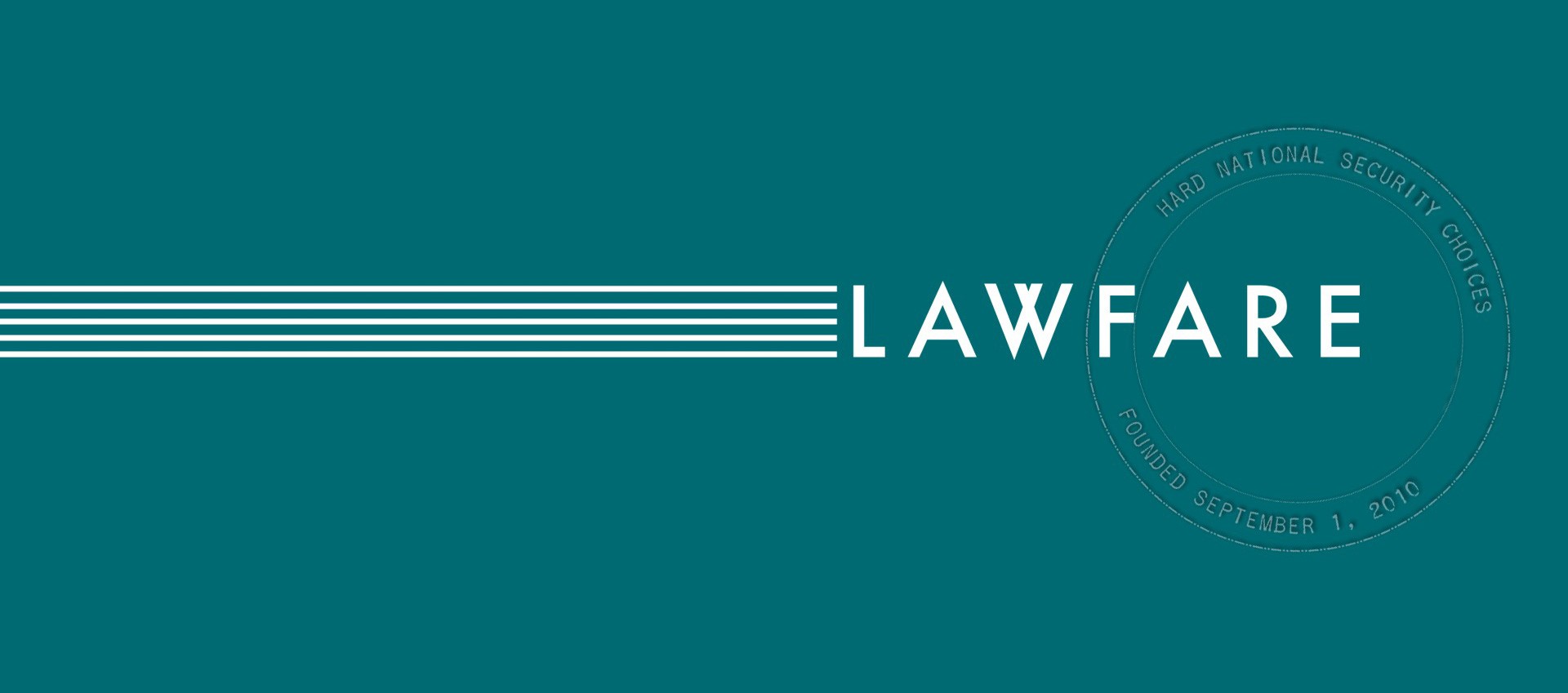The Week That Was: All of Lawfare in One Post

Published by The Lawfare Institute
in Cooperation With

On Lawfare Live, Benjamin Wittes sat down with Gerard Magliocca and Roger Parloff to discuss the Colorado Supreme Court’s ruling that former President Donald Trump is disqualified from being president under Section 3 of the 14th Amendment and as such cannot be listed on the state’s Republican presidential primary ballot:
Audio from the Lawfare Live with Wittes, Magliocca, and Parloff was also published as an episode of the Lawfare Podcast:
Caleb Benjamin shared the Colorado Supreme Court’s ruling disqualifying Trump from the state’s primary ballot.
Tyler McBrien shared the Department of the Interior Inspector General report about the Jan. 6 attack on the Capitol.
On this week’s episode of “Lawfare Live: Trump’s Trials and Tribulations,” Wittes sat down with Anna Bower and Anthony Michael Kreis to discuss the Colorado Supreme Court’s ruling disqualifying Trump from the state’s ballot, the 11th Circuit Court of Appeals’s denial of Mark Meadows’s removal request, updates in the Mar-a-Lago case, and more:
Benjamin shared two government reports on foreign interference attempts in the 2022 elections.
On the Lawfare Podcast, Wittes sat down with Bower, Parloff, and Steve Vladeck to discuss Special Counsel Jack Smith's petition to the Supreme Court for a writ of certiorari “before judgment” on the question of presidential immunity, the Court's decision to weigh in on Fischer v. United States, and more:
Seamus Hughes and Camden Carmichael discussed the Justice Department’s increased use of 18 U.S.C. § 875 (c), “communicating a threat,” in prosecuting domestic extremists.
Avery Schmitz discussed how U.S.-based extremist groups conduct operations in Mexico aimed at suppressing migration and “gathering intelligence” in support of QAnon-adjacent conspiracies. Schmitz also unpacked the potential legal ramifications extraterritorial vigilantism might carry in U.S. courts.
Derek E. Bambauer and Melanie J. Teplinsky argued that the software liability regime proposed as part of the National Cybersecurity Strategy should include both an immunity safe harbor to shield software creators and vendors who follow best practices and an inverse safe harbor that would impose liability on developers who engage in defined worst practices.
On the Lawfare Podcast, Paul Rosenzweig sat down with Jack Cable, Bob Lord, and Lauren Zabierek to discuss what Secure by Design (SbD) is in the cyber context, what SbD design and implementation looks like, the research that might help our collective understanding of the SbD concept and how it might work, and more:
Jacob Horne and Jim Dempsey discussed the cybersecurity deficiencies of U.S. public water systems and the need for congressional action after litigation brought by Republican state attorneys general and industry groups led the EPA to walk back regulation on the issue.
On the Lawfare Podcast, David Kris and Bryan Cunningham sat down with Bryan Vorndran to discuss his career trajectory, the FBI's top cyber challenges, the Bureau's relationships with other agencies and private sector entities, and the challenges posed by China:
Andrew K. Woods discussed how a string of court rulings has held that Section 230 immunizes technology platforms from claims arising from foreign conduct. Woods argued that the rulings are bad policy and an incorrect application of the presumption against extraterritoriality.
Susan Landau discussed how contrary to the existing assumption that end-to-end encryption (E2EE) harms children, kids, particularly at-risk youth, benefit from the privacy and confidentiality provided by E2EE.
On the Lawfare Podcast, in an edition of Arbiters of Truth, Lawfare’s series on the information ecosystem, Quinta Jurecic sat down with Jeff Horwitz and Matt Perault to discuss Horwitz’s reporting showing that Facebook employees had raised alarms about potential harms caused by the company’s products, what his findings tell us about how Meta functions, and more:
Kevin Frazier proposed a “right to reality” mandating the identification of AI-generated materials. He outlined a potential legal justification for the proposed right and explained the policy rationale behind it.
On the Lawfare Podcast, Scott R. Anderson sat down with Joel Braunold to discuss the state of Israel’s military campaign, how it is impacting Israeli and Palestinian politics, and the challenges of reaching a new status quo that stands a chance of meeting the demands of the parties involved in the conflict:
Nakissa Jahanbani, Benjamin, Robert Fisher, Muhammad Najjar, Muhammad al-`Ubaydi, and Benjamin Johnson examined the dynamics driving Iranian-backed militias’ attacks on U.S. installations in Iraq and Syria and the thorny escalation challenges the attacks create.
Marc Garlasco discussed the policies laid out in the Department of Defense’s groundbreaking new instruction on civilian harm mitigation and response.
Benjamin shared the “DOD Instruction on Civilian Harm Mitigation and Response.”
In an installment of Lawfare’s Foreign Policy Essay series, George J. Gilboy and Eric Heginbotham discussed their findings from a U.S.-China economic conflict simulation and argued that the U.S. must take steps now to better prepare for such a clash.
On Rational Security, Anderson and Jurecic sat down with Eugenia Lostri and Natalie K. Orpett to discuss the Colorado Supreme Court’s ruling disqualifying Trump from the state’s ballot, the new multinational maritime effort to prevent Houthi attacks against shipping, Argentina’s new president Javier Milei, and more:
William Byrd discussed differing estimates of Afghanistan’s 2023 opium harvest and what they suggest about the Taliban’s ability to enforce its opium cultivation ban and the potential future paths for the ban.
On Chatter, David Priess sat down with Katlyn Carter to discuss her new book entitled, “Democracy in Darkness: Secrecy and Transparency in the Age of Revolutions,” the concepts of reflective representation and insulated representation, the Continental Congress's secrecy, the crucial cases of the Jay Treaty and the Alien and Sedition Acts, and more:
And Jack Goldsmith shared the Winter 2023 supplement for Bradley, Deeks, & Goldsmith, Foreign Relations Law: Cases and Materials (7th ed. 2020).
And that was the week that was.

